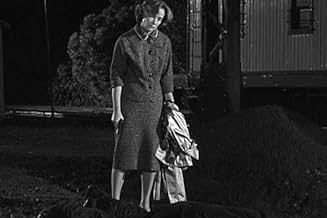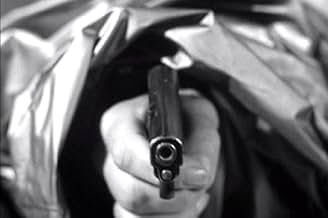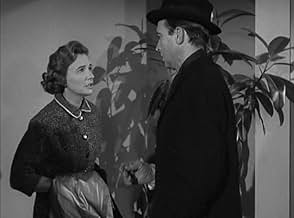A mentally unstable secretary finally catches up to her cruel former boss and makes him listen to what she has to say, at gunpoint.A mentally unstable secretary finally catches up to her cruel former boss and makes him listen to what she has to say, at gunpoint.A mentally unstable secretary finally catches up to her cruel former boss and makes him listen to what she has to say, at gunpoint.
- Director
- Writers
- Stars
- Director
- Writers
- All cast & crew
- Production, box office & more at IMDbPro
Featured reviews
A mentally unstable secretary finally catches up to her cruel former boss and makes him listen to what she has to say, at gunpoint. Excellent performance by Phyllis Thacker, who is quite intense, noirish look and the lovely trains makes this an interesting, if a little on the bleak side. Zachary Scott looks suitably pompous.
Appears as though none of the reviewers read the story. Too bad. It's only 12 pages long, and is considered one of John Cheever's best. This says something, since Cheever, aka "The Chekov of the Suburbs", is acknowledged as one of America's great short story writers.
The suburb depicted here is the one that's the setting for most all Cheever's fiction that takes place in America. "Shady Hill" has been identified as Ossining, New York, a village about forty miles North of New York City, along the Hudson River. Apart from having been the Cheever residence, it is famous for Sing-Sing prison. The commuter train's tracks run through the prison grounds. Back when the penitentiary's electric chair was still in use, "Old Sparky's" draw on the power grid dimmed the town's lights for the requisite number of minutes.
Most of the reviews focus on Miss Dent's "mental illness." This is uncharitable. A broke, unskilled, middle-aged refugee from Allentown PA, who lives solo in a crummy room, would be expected to have emotional problems...today as in 1954, when the story was published.
Miss Dent affirms that she's never in her whole life had a true friend. This is possible; endemic quiet desperation was diagnosed by Thoreau centuries ago. Yet she doesn't lack self-esteem ("I'm better than you!"). And she says she's clairvoyant. Mr. Blake should have gotten the signal right away, when on their first meeting he does a little amateur graphology: Her handwriting "has the marks of a claw."
One reviewer refers to her as merely "a mentally unstable secretary." But at least she's a pretty one who can boast a healthy libido. She's not angling for a raise, she's just a lonely girl in the Big Apple who'd enjoy some male company, and isn't afraid to ask for it.
Mr. Blake may be a lecher, but he's not a philistine. Miss Dent's record collection features the classics, "Liszt, Brahms, Beethoven", and her boss approves. The assignation is a lot steamier in the Hitchcock iteration than in the original story. And is fully consensual.
The episode's denouement is pretty faithful to the story. The setting, a neglected railroad siding not far from Shady Hill station, is suitably gritty. It's within sight of the prison. And it's got a scary literary pedigree: Just down the road is the bridge in Sleepy Hollow over which Irving's Headless Horseman rode.
Some reviewers felt that this ending was "incomplete" or "lacked punch." One wonders what they want. Someone complained that the tiny prop gun is really a cigarette lighter. Okay. What would they prefer, an Alec Baldwin Special?
The Hitchcock version does feature one powerful visual moment not even hinted at in the story.
When Miss Dent is fired, she actually sees Blake seated at his desk behind a glass door frame, not twenty feet away, studiously ignoring her. He slips out the back door. In the story, the dismissal doesn't even warrant its own paragraph; she's discarded in half a dozen sentences. And it all happens during her lunch hour. The two don't meet again until they're seated in the same coach on the way to Shady Hill, during that "slow-moving train" ride one reviewer found so boring.
Director John Brahm had two seasoned performers to work with. Phyllis Thaxter is convincing, and her Down East accent somehow makes her more credible still. Zachary Scott looks even nastier minus the mustache; his approach is minimalistic, and it works.
The only flaw I can identify is that while in the story, the last scene is played out in a chilly downpour, this is missing in the film. It's after sundown, and it's cold, and that helps. But it's not enough. The scene needs mud.
The suburb depicted here is the one that's the setting for most all Cheever's fiction that takes place in America. "Shady Hill" has been identified as Ossining, New York, a village about forty miles North of New York City, along the Hudson River. Apart from having been the Cheever residence, it is famous for Sing-Sing prison. The commuter train's tracks run through the prison grounds. Back when the penitentiary's electric chair was still in use, "Old Sparky's" draw on the power grid dimmed the town's lights for the requisite number of minutes.
Most of the reviews focus on Miss Dent's "mental illness." This is uncharitable. A broke, unskilled, middle-aged refugee from Allentown PA, who lives solo in a crummy room, would be expected to have emotional problems...today as in 1954, when the story was published.
Miss Dent affirms that she's never in her whole life had a true friend. This is possible; endemic quiet desperation was diagnosed by Thoreau centuries ago. Yet she doesn't lack self-esteem ("I'm better than you!"). And she says she's clairvoyant. Mr. Blake should have gotten the signal right away, when on their first meeting he does a little amateur graphology: Her handwriting "has the marks of a claw."
One reviewer refers to her as merely "a mentally unstable secretary." But at least she's a pretty one who can boast a healthy libido. She's not angling for a raise, she's just a lonely girl in the Big Apple who'd enjoy some male company, and isn't afraid to ask for it.
Mr. Blake may be a lecher, but he's not a philistine. Miss Dent's record collection features the classics, "Liszt, Brahms, Beethoven", and her boss approves. The assignation is a lot steamier in the Hitchcock iteration than in the original story. And is fully consensual.
The episode's denouement is pretty faithful to the story. The setting, a neglected railroad siding not far from Shady Hill station, is suitably gritty. It's within sight of the prison. And it's got a scary literary pedigree: Just down the road is the bridge in Sleepy Hollow over which Irving's Headless Horseman rode.
Some reviewers felt that this ending was "incomplete" or "lacked punch." One wonders what they want. Someone complained that the tiny prop gun is really a cigarette lighter. Okay. What would they prefer, an Alec Baldwin Special?
The Hitchcock version does feature one powerful visual moment not even hinted at in the story.
When Miss Dent is fired, she actually sees Blake seated at his desk behind a glass door frame, not twenty feet away, studiously ignoring her. He slips out the back door. In the story, the dismissal doesn't even warrant its own paragraph; she's discarded in half a dozen sentences. And it all happens during her lunch hour. The two don't meet again until they're seated in the same coach on the way to Shady Hill, during that "slow-moving train" ride one reviewer found so boring.
Director John Brahm had two seasoned performers to work with. Phyllis Thaxter is convincing, and her Down East accent somehow makes her more credible still. Zachary Scott looks even nastier minus the mustache; his approach is minimalistic, and it works.
The only flaw I can identify is that while in the story, the last scene is played out in a chilly downpour, this is missing in the film. It's after sundown, and it's cold, and that helps. But it's not enough. The scene needs mud.
Sooner or later, Hollywood's most classic villian, Zachary Scott, had to make an appearance on Hitch's tv show. It was a must. Scott, naturally, plays his most memorable role, that of a cad who apparently had a one night stand with his secretary, Miss Dent (exceptionally played by Phyllis Thaxter).
This is actually a duel between two unforgettable actors, based on a story by Pulitzer Prize winning author John Cheever. Surprisingly, it was written for tv by Charlotte Armstrong, a rival to Agatha Christie, author of 29 mystery novels.
Bottom line, Miss Dent corners Mr. Blake (Scott) on a train -- and with a gun -- and wants to tell him exactly what she thinks of him during the excruciating LONG ride home. What an ordeal, and one heck of a character study, that of a bitter, lonely woman confronting the man of her nightmares.
A must see. Excellent direction, as always, by John Brahm. There's the debate as to who appeared more on Hitch's tv show, Phyllis Thaxter or Raymond Bailey (from the BEVERLY HILLBILLIES), who also guests in this episode. Thaxter co-starred in a total of six episodes, Bailey in ten. Good trvia question for buffs.
Best of SEASON 6 EPISODE 5. Remastered dvd box set. 5 dvds. Released 2013.
This is actually a duel between two unforgettable actors, based on a story by Pulitzer Prize winning author John Cheever. Surprisingly, it was written for tv by Charlotte Armstrong, a rival to Agatha Christie, author of 29 mystery novels.
Bottom line, Miss Dent corners Mr. Blake (Scott) on a train -- and with a gun -- and wants to tell him exactly what she thinks of him during the excruciating LONG ride home. What an ordeal, and one heck of a character study, that of a bitter, lonely woman confronting the man of her nightmares.
A must see. Excellent direction, as always, by John Brahm. There's the debate as to who appeared more on Hitch's tv show, Phyllis Thaxter or Raymond Bailey (from the BEVERLY HILLBILLIES), who also guests in this episode. Thaxter co-starred in a total of six episodes, Bailey in ten. Good trvia question for buffs.
Best of SEASON 6 EPISODE 5. Remastered dvd box set. 5 dvds. Released 2013.
Ms. Thaxter has a problem. Whether Mr.Scott can recognize this and tries to take advantage of her or he is just unlucky, isn't clear. In either case the characters played by these fine actors find serious trouble in their confrontation on a commuter train.
Zachary Scott, who was arguably the king of Film-Noir villainous cads, is up to his old tricks in this dark tale of humiliation and revenge. He seduces and abruptly fires his new secretary, a high strung, vulnerable Phyllis Thaxter. But then she valiantly plans and executes her special brand of retaliation. Her payback is possibly more degrading than the various and sundry ways old Zachary 'bit the dust' in those '40s movies, such as "Mildred Pierce" and "Flamingo Road." Both actors were nothing short of brilliant in their characterizations and the train ride was especially intense. This episode remains my favorite not only because of the story, but also because of the perfectly cast players for those two roles.
Did you know
- ConnectionsRemade as 3 by Cheever: The 5:48 (1979)
- SoundtracksFuneral March of a Marionette
Written by Charles Gounod
Details
- Runtime30 minutes
- Color
- Sound mix
- Aspect ratio
- 1.33 : 1
Contribute to this page
Suggest an edit or add missing content











